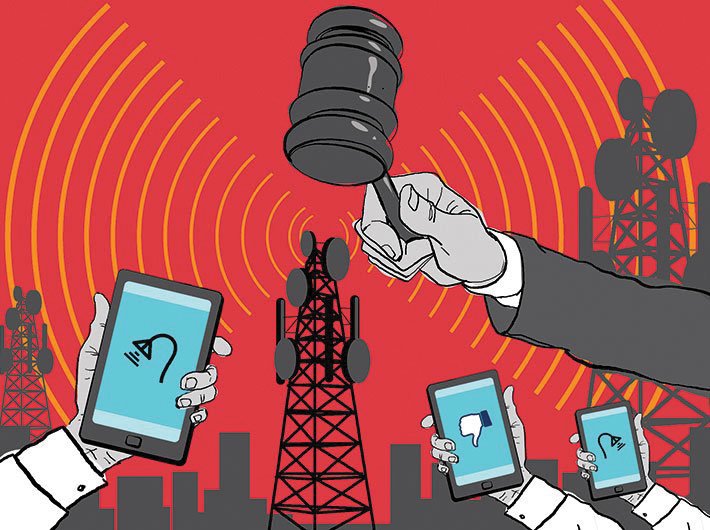Now that the big bang event is over, where does the consumer stand in the new scenario?
The biggest ever telecom spectrum auction is over, and again it’s time to take stock. The government, of course, has failed miserably to meet its targets – due to a variety of reasons. The industry, already amid a price war thanks to the entry of Reliance Jio, has not been able to shell out much for the new bands on offer. The consumer, however, looks forward to better services and some relief from existing problems like call drops. Will that hope materialise soon?
Rajan Mathews, director general, Cellular Operations Association of India (COAI), believes that the issues concerning network including call drops will be solved now, but it will take time. “Once the spectrum is allocated, we have to put it into operation, part of which means that you have to build cell towers. So we have to wait for six-nine months to see the complete impact of this,” he says.
He feels that now the operators have adequate amount of spectrum. Telecom experts, however, say that lack of spectrum was not the primary issue behind call drops.
“In places like Delhi, a high-density mobile area, there are gaps in the network and poor signal. Call drops issue is more about lack of mobile phone towers and poor utilisation of spectrum than inadequacy of spectrum,” says Prabir Purkayastha, chairperson, Knowledge Commons, and vice-president, Free Software Movement of India.
He blames service providers for ignoring voice services as it no longer serves them good margins.
Operators are shifting towards data service since it has become a lucrative market lately. Hence, the focus on voice service is going down causing frequent call drops, Purkayastha explains. “Operators have really not upgraded their voice network and they are treating it as a legacy operation, which after sometime won’t get them enough money,” he says.
Agrees Romal Shetty, head of telecom division at KPMG, a consultancy organisation, but he also believes that voice will not go out of business any time soon.
“India will not do away with 2G for some time. In rural areas, operators will still focus on voice. The change will come in semi-urban areas including tier-2 and -3 cities, in terms of 3G coverage. Whereas in metro areas, the move will be towards 4G,” says Shetty, adding, “We will continue with the twin tracks of Bharat [rural India] and India [urban] and slowly merge somewhere. But it will take some time.”
Therefore, the operators have to continue investing on infrastructure to address the network-related issues.
Aranya Shankar, a 27-year-old from Delhi, feels the same. Since 2006 she has been a subscriber of Airtel – India’s largest telecom operator. “Call drops have increased in the last two years. I don’t see any improvement so far. In my home, network was never an issue. But now I don’t receive signal inside my home. Why should I pay for a call that gets disconnected in the middle of a conversation? Operators should invest more on network and ensure that call drops don’t happen,” she says.
The 2016 spectrum auction ended on October 6. It fetched '65,789 crore to the government from the sale of 965 MHz of spectrum. But this revenue collected was far below its expectation, only 11.6 percent of the expected '5.66 lakh crore. Out of total 2,354.55 MHz spectrum only 41 percent was sold. The auction failed as the spectrum band of 700 MHz and 900 MHz failed to get any bidder due to their high prices.
The government meanwhile is keeping its hopes high. JS Deepak, telecom secretary, was quoted in media saying, “The issue of quality of service, spectrum scarcity in India is history with this auction… The appetite of the industry has been satisfied.”
So who are the winners at the end of the day? Mathews believes that both consumers and operators are the winners. Users’ demands have encouraged more operators to invest in this industry, so they are primarily the winners. For operators, “getting appropriate quantum of spectrum at reasonable prices” is also a win-win situation.
Though the high price of spectrum, especially of 700 Mhz band, has discouraged the operators to invest in it, yet the spectrum purchased is enough to offer new data services like Internet of Things (IoT) and cloud computing, feels Mathews.
Shetty of KPMG, on the other hand, feels that it is the industry that has come out as the real winner. “Operators have bid rationally and did not act irrationally by bidding for 700 Mhz, which was really expensive.” They have filled spectrum gaps in areas where they had no presence. “This has removed the need for intra-circle roaming (ICR, an agreement between two telecom operators to provide roaming service to users in different cities), for which operators were paying more,” he adds.
The operators now have enough spectrum to roll out data services, which will also improve voice services, says Virag Gupta, a supreme court lawyer and cyber law expert. “Telecom service providers (TSPs) were using a limited amount of spectrum for providing both data and voice services. However, as a result of buying spectrum for data services in the auction, the TSPs will now be in a position to provide data services in a better manner. A consequence of the same may be the freeing up of spectrum which was earlier used for data as well as voice, hence enhancing the voice services,” says Gupta.
The auction on the flip side also revealed the poor financial health of the industry, says Purkayastha. “Not having enough takers for 700 Mhz band shows that telecom operators are not willing to invest such a large amount. This is an issue of concern. And we could see a collapse of the telecom sector if the issue is not addressed. This spectrum auction is a larger indication of that.”
Meanwhile, the increase in competition among the telcos has benefitted the consumers. The entry of Reliance Jio, a newly launched telecom services by Reliance Industries Limited, has brought a significant disruption in the market. The network’s aggressive plans include free voice calling service, competitively priced 4G data packs and free subscription till the year-end. Its entry has already brought other service providers to their toes.
Many operators as a result have already slashed prices of their data packs, which have benefitted users. “Prices have come down and it will affect the balance sheet of operators, but there is no option. Large incumbents will try to protect their customers. They need market share. You cannot be marginal and small player to succeed in telecom,” Shetty says.
But the price war will not last for long, he adds. “Right now, it will not be possible for operators to increase prices. It will go down for some time. But this competition of price will affect the industry for 12 to 18 months; after that it will settle down. Beyond a point Reliance Jio will not lower prices of its services, since it is a commercial company. They will continue to create disruption in the market until they get critical mass.”
India is a price sensitive market and lowering of prices as a result of increased competition does cause a shift of preferences among users. But ultimately it is going to be about the quality of network that users will care about, experts say.
“The quality of service does not depend upon how many big players we have. For example, Vodafone has been in Delhi for a long time. If quality of service is poor even in Delhi, what we can expect from other cities?” asks Purkayastha. Though he agrees that free voice service of Reliance Jio has attracted many users, yet it is quality which will make the real difference.
(The article appears in the October 16-31, 2016 issue)

